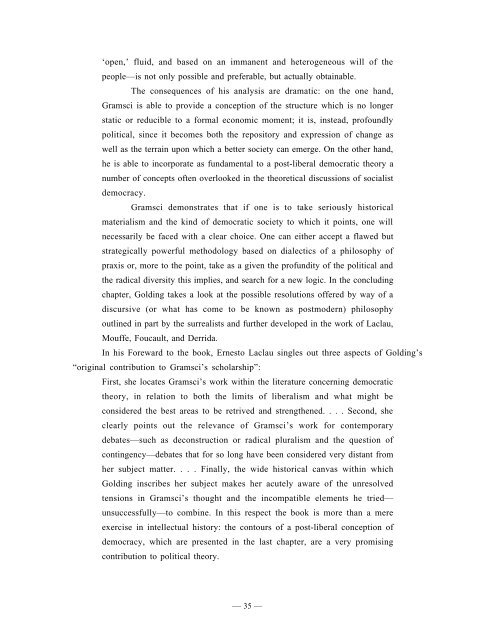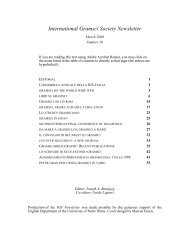Newsletter - International Gramsci Society
Newsletter - International Gramsci Society
Newsletter - International Gramsci Society
You also want an ePaper? Increase the reach of your titles
YUMPU automatically turns print PDFs into web optimized ePapers that Google loves.
‘open,’ fluid, and based on an immanent and heterogeneous will of the<br />
people—is not only possible and preferable, but actually obtainable.<br />
The consequences of his analysis are dramatic: on the one hand,<br />
<strong>Gramsci</strong> is able to provide a conception of the structure which is no longer<br />
static or reducible to a formal economic moment; it is, instead, profoundly<br />
political, since it becomes both the repository and expression of change as<br />
well as the terrain upon which a better society can emerge. On the other hand,<br />
he is able to incorporate as fundamental to a post-liberal democratic theory a<br />
number of concepts often overlooked in the theoretical discussions of socialist<br />
democracy.<br />
<strong>Gramsci</strong> demonstrates that if one is to take seriously historical<br />
materialism and the kind of democratic society to which it points, one will<br />
necessarily be faced with a clear choice. One can either accept a flawed but<br />
strategically powerful methodology based on dialectics of a philosophy of<br />
praxis or, more to the point, take as a given the profundity of the political and<br />
the radical diversity this implies, and search for a new logic. In the concluding<br />
chapter, Golding takes a look at the possible resolutions offered by way of a<br />
discursive (or what has come to be known as postmodern) philosophy<br />
outlined in part by the surrealists and further developed in the work of Laclau,<br />
Mouffe, Foucault, and Derrida.<br />
In his Foreward to the book, Ernesto Laclau singles out three aspects of Golding’s<br />
“original contribution to <strong>Gramsci</strong>’s scholarship”:<br />
First, she locates <strong>Gramsci</strong>’s work within the literature concerning democratic<br />
theory, in relation to both the limits of liberalism and what might be<br />
considered the best areas to be retrived and strengthened. . . . Second, she<br />
clearly points out the relevance of <strong>Gramsci</strong>’s work for contemporary<br />
debates—such as deconstruction or radical pluralism and the question of<br />
contingency—debates that for so long have been considered very distant from<br />
her subject matter. . . . Finally, the wide historical canvas within which<br />
Golding inscribes her subject makes her acutely aware of the unresolved<br />
tensions in <strong>Gramsci</strong>’s thought and the incompatible elements he tried—<br />
unsuccessfully—to combine. In this respect the book is more than a mere<br />
exercise in intellectual history: the contours of a post-liberal conception of<br />
democracy, which are presented in the last chapter, are a very promising<br />
contribution to political theory.<br />
— 35 —



